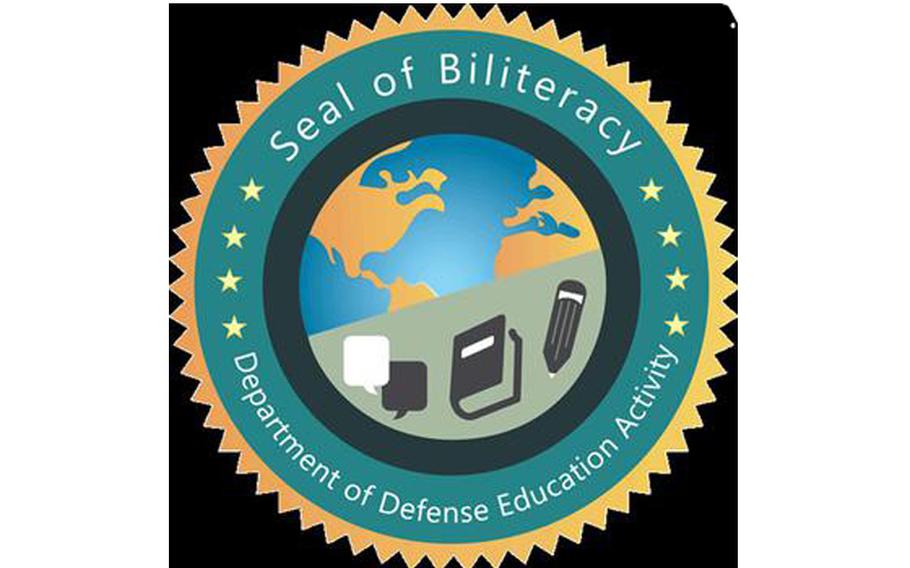
The Department of Defense Education Activity's seal of biliteracy is taking effect in the upcoming school year to provide academic recognition of students' proficiency in English as well as any of a number of foreign languages. (DODEA)
Defense Department schools will introduce a new biliteracy certification in the upcoming academic year, with the aim of encouraging youngsters to show their skills in languages critical to the military and national security.
Students who meet the Department of Defense Education Activity’s criteria for biliteracy will have a seal stamped on their diploma and the designation included in high school transcripts in recognition of the dual language proficiency, DODEA spokeswoman Jessica Tackaberry said Tuesday.
The designation reflects a student’s proficiency in end-of-the-year testing and Advanced Placement exams for English and a second language, including Arabic, Mandarin Chinese, French, German, Italian, Japanese, Korean, Spanish, Turkish and American Sign Language.
DODEA tests skills in those languages in learning levels I, II, III and IV at the end of each school year, Tackaberry said. Students may take Advanced Placement classes in all but Korean, Turkish and ASL.
In addition, a Spanish for Heritage Speakers initiative is offered at DODEA middle and high schools in Puerto Rico, Tackaberry said.
Students interested in earning the seal can talk to their school counselors about qualification requirements.
For the English half of the biliteracy recognition, proficiency means a 600 or higher on the SAT, a 3 or above on an AP English language or literature exam or successful completion of an English for Speakers of Other Languages program.
There is no passing score for foreign languages at DODEA schools, so students must show proficiency by achieving at least an intermediate mid level, or 5 out of 9, on the STAMP 4S assessment.
They can also qualify for the biliteracy seal by scoring a 3 or higher out of 5 on a world language AP exam.
“This initiative celebrates bilingualism and prepares military-connected students for success in college and global careers,” DODEA said in a statement last week.
It also fulfills DOD’s goal of “developing potential future warriors’ proficiency in languages that have been identified as critical to its mission,” according to the statement.
The U.S. government has a slate of languages deemed critical to national security interests, economic prosperity and engagement with the world, according to the State Department website.
There are a dozen listed in its Critical Language Scholarship program, including Korean, Japanese, Chinese, Arabic, Turkish, Russian and Portuguese.
About 8% of this year’s DODEA graduating class of 2,795 students worldwide planned to enlist in the military, a DODEA statement July 2 said. In addition to the 223 graduates in that category, 121 received military academy appointments or ROTC scholarships.
DODEA enrolls over 67,000 students at its 161 schools in 11 locations abroad, seven U.S. states, Guam and Puerto Rico, according to the agency’s website.
Having a strong dual language grasp leads to higher reading proficiency and academic achievement, studies show.
DODEA officials hope the designation will be recognized by college admissions offices and lead to improved job access for students after graduation.
“The seal of biliteracy represents our deep commitment to preparing military-connected students for success in an interconnected world,” agency director Beth Narvaez in the statement.
She called it “a symbol of academic excellence” that celebrates the global experiences of the DODEA student body.